Unit 1 Knowing Me, Knowing You Using language课件(34张)
文档属性
| 名称 | Unit 1 Knowing Me, Knowing You Using language课件(34张) | 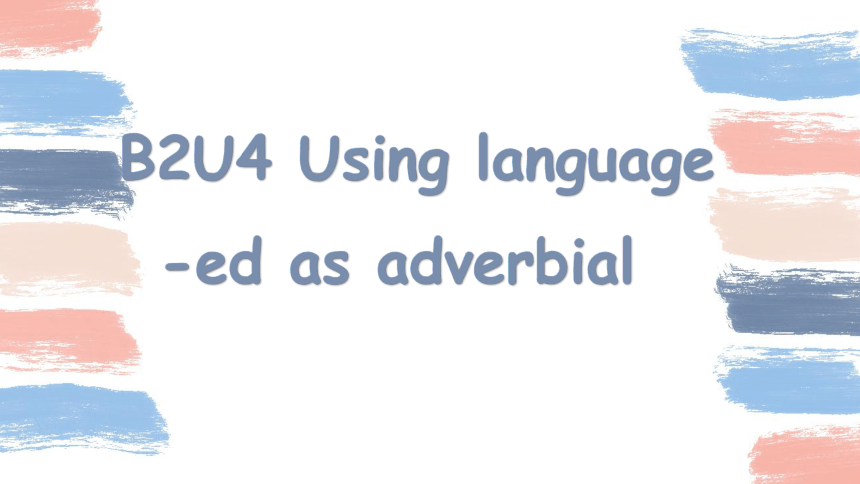 | |
| 格式 | pptx | ||
| 文件大小 | 6.7MB | ||
| 资源类型 | 教案 | ||
| 版本资源 | 外研版(2019) | ||
| 科目 | 英语 | ||
| 更新时间 | 2022-05-07 17:37:21 | ||
图片预览

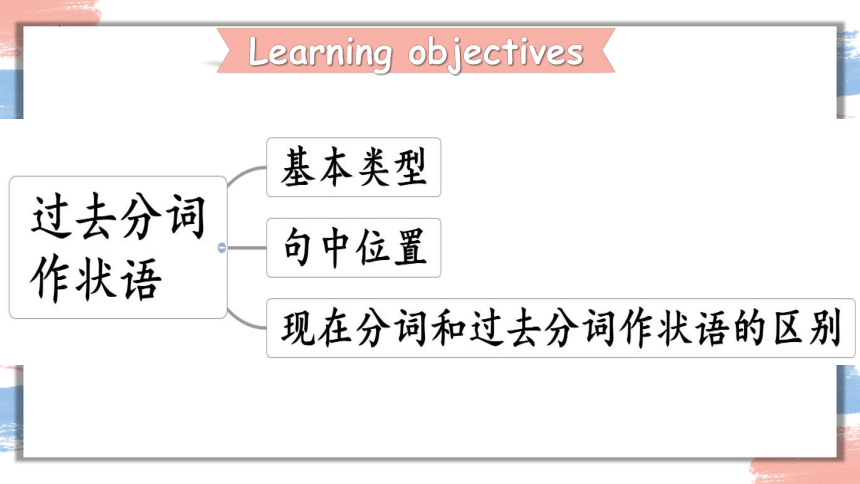

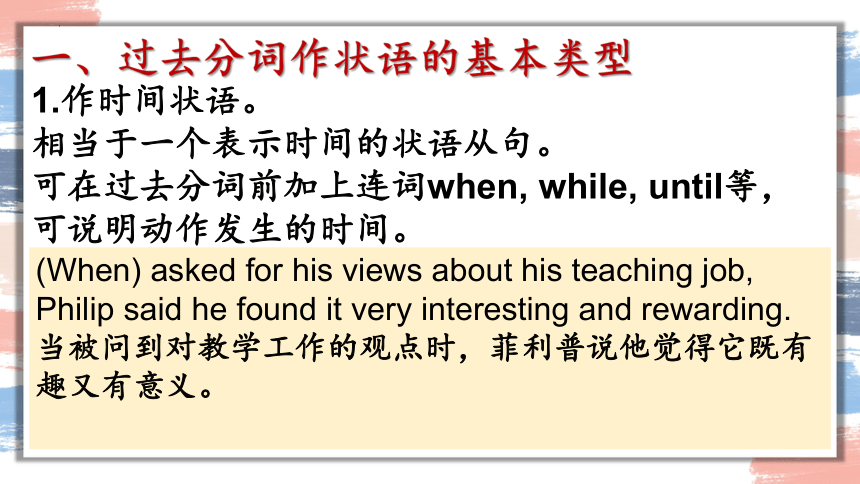
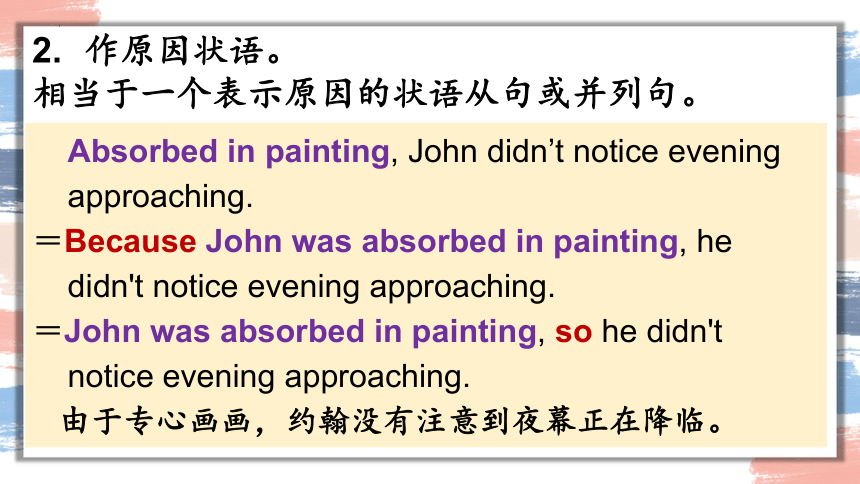
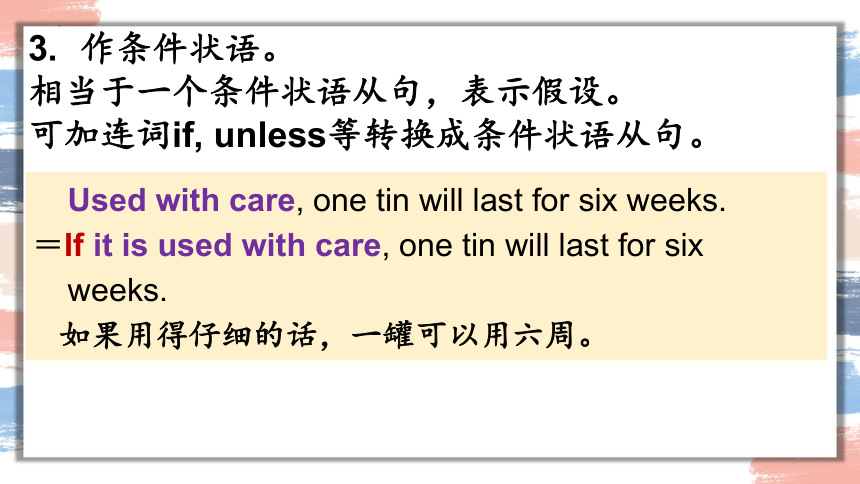

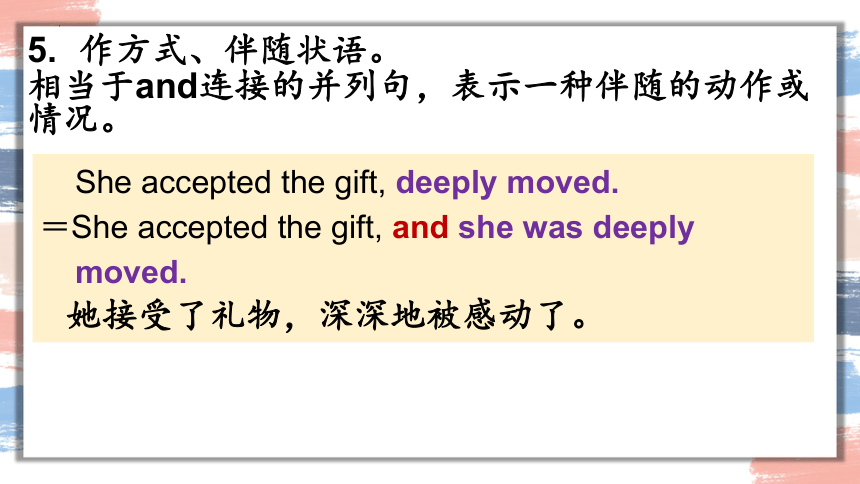
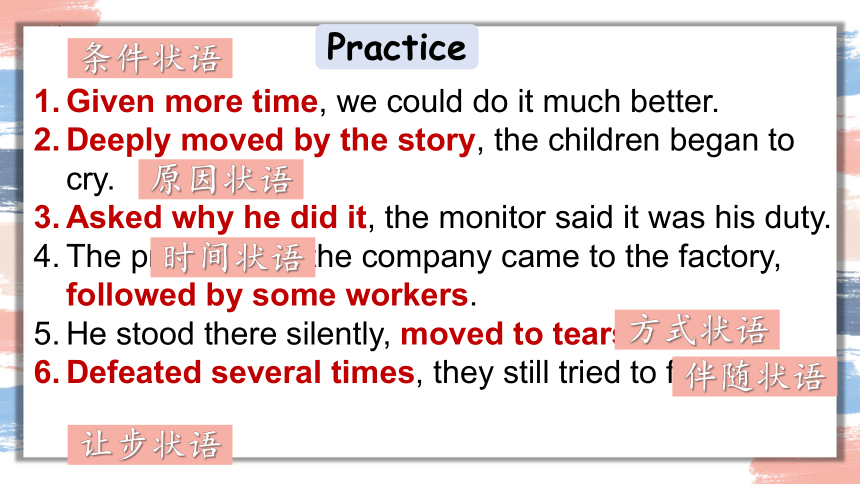
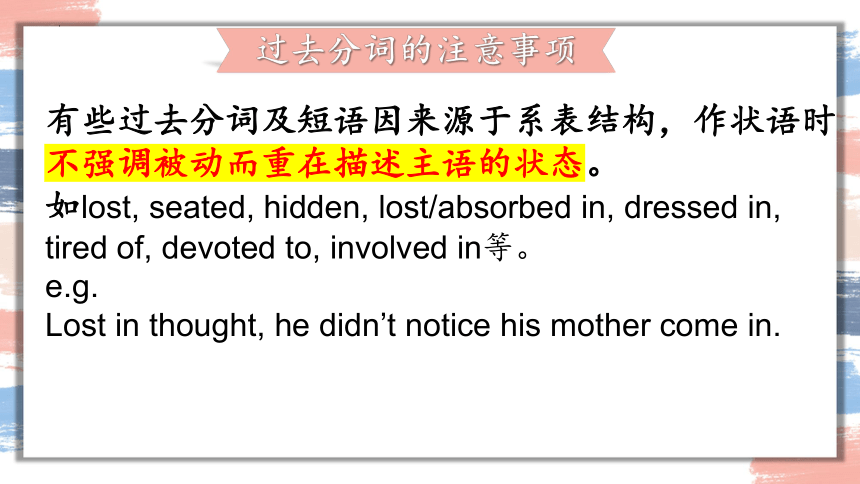
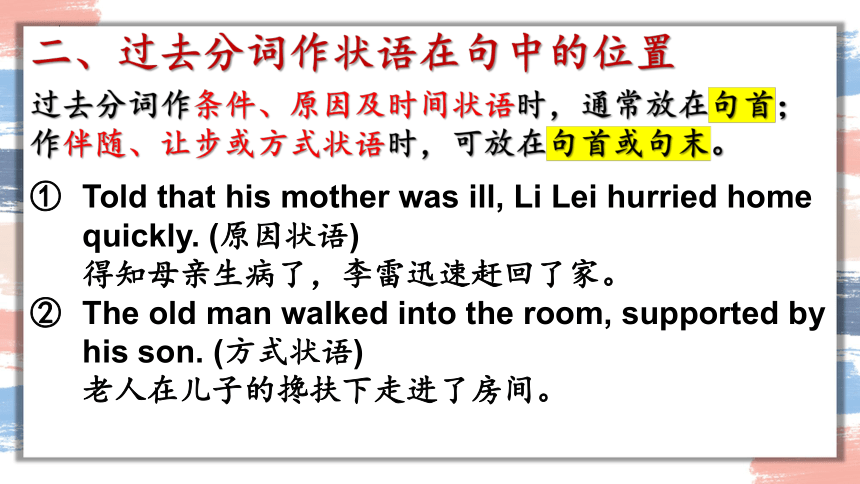

文档简介
(共34张PPT)
B2U4 Using language
-ed as adverbial
Learning objectives
-ed as adverbial 过去分词作状语
定义:
过去分词作状语,可以表示时间、让步、条件、原因、方式和伴随,相当于一个状语从句。其逻辑主语为主句的主语,且与主句主语之间构成逻辑上的动宾关系。
一、过去分词作状语的基本类型
作时间状语。
相当于一个表示时间的状语从句。
可在过去分词前加上连词when, while, until等,可说明动作发生的时间。
(When) asked for his views about his teaching job, Philip said he found it very interesting and rewarding.
当被问到对教学工作的观点时,菲利普说他觉得它既有趣又有意义。
作原因状语。
相当于一个表示原因的状语从句或并列句。
Absorbed in painting, John didn’t notice evening
approaching.
=Because John was absorbed in painting, he
didn't notice evening approaching.
=John was absorbed in painting, so he didn't
notice evening approaching.
由于专心画画,约翰没有注意到夜幕正在降临。
作条件状语。
相当于一个条件状语从句,表示假设。
可加连词if, unless等转换成条件状语从句。
Used with care, one tin will last for six weeks.
=If it is used with care, one tin will last for six
weeks.
如果用得仔细的话,一罐可以用六周。
作让步状语。
相当于让步状语从句。
有时可加 although, though, even if, even though, “whether...or...”等连词转换成让步状语从句。
Defeated by his opponent, he never gave up
any hope.
=Although he was defeated by his opponent,
he never gave up any hope.
尽管被对手击败,但是他从没放弃希望。
作方式、伴随状语。
相当于and连接的并列句,表示一种伴随的动作或情况。
She accepted the gift, deeply moved.
=She accepted the gift, and she was deeply
moved.
她接受了礼物,深深地被感动了。
Given more time, we could do it much better.
Deeply moved by the story, the children began to cry.
Asked why he did it, the monitor said it was his duty.
The president of the company came to the factory, followed by some workers.
He stood there silently, moved to tears.
Defeated several times, they still tried to fight.
Practice
条件状语
原因状语
时间状语
方式状语
伴随状语
让步状语
过去分词的注意事项
有些过去分词及短语因来源于系表结构,作状语时不强调被动而重在描述主语的状态。
如lost, seated, hidden, lost/absorbed in, dressed in, tired of, devoted to, involved in等。
e.g.
Lost in thought, he didn’t notice his mother come in.
二、过去分词作状语在句中的位置
过去分词作条件、原因及时间状语时,通常放在句首;
作伴随、让步或方式状语时,可放在句首或句末。
Told that his mother was ill, Li Lei hurried home quickly. (原因状语) 得知母亲生病了,李雷迅速赶回了家。
The old man walked into the room, supported by his son. (方式状语) 老人在儿子的搀扶下走进了房间。
三、现在分词与过去分词作状语的区别
两者的最主要区别:
与所修饰的主语在逻辑上是主动还是被动关系。
现在分词作状语时,现在分词表示的动作与主语之间在逻辑上是主动关系。
过去分词作状语时,主语是过去分词动作的承受者,它们之间是被动关系。
Practice
_______(see) from the top of the hill, the school looks like a big garden.
_________ (give) more attention, the accident could have been avoided.
__________(criticise) by the teacher, the girl was very upset.
_______(leave) alone at home, Jenny didn’t feel afraid at all.
____________(follow) by his students, the teacher went into the lab.
Seen
Criticised
Left
Followed
Given
Practice
When________(give) a physical examination, you should keep calm.
His homework___________(finish), he went out to play with other kids happily.
______(lose) in thought, he almost knocked into the big tree in front of him.
____________(offer) an important role in a new movie, Andy has got a chance to become famous.
given
Offered
Lost
finished
Practice
__________(see) from the top of the tower, we can get a better view of our city.
Time, _________ (use) correctly, is money in the bank.
Seeing
used
Activity 2 (P5)
Rewrite the underlined sentences with the –ed form.
Last week, attracted by a particular article in a magazine, Anne bought it.
Praised in class, Anne felt happy as well as ashamed.
Shocked by the decision, Anne did not know what to do.
Last week, Anne was attracted by a particular article in a magazine, so she bought it. Three days ago, to complete her homework quickly, she grabbed the magazine from her desk drawer and copied part of the article without thinking. Her teacher was very satisfied with her homework. Anne was praised in class, and she felt happy as well as ashamed. Then, the teacher wanted to enter her homework into a writing competition. Anne was shocked by the decision and did not know what to do. If she told the truth, the whole class would find out and accuse her of cheating. They would look down on her. lf she kept silent, maybe no one would ever find out...
What should Anne do
If she told the truth, the whole class would find out and accuse her of cheating.
accuse sb. of sth. 控告某人某事
inform sb. of sth. 告知某人某事
look down on/ upon 轻视,瞧不起
look up 抬头看,查阅
look back on 回忆,回顾
look out (for) 注意,留意,留神
look through 浏览,仔细查看
Activity 3 (P5)
Read the plot summary and choose the correct form of the words.
Inside Out is an animated film about the five emotions of a girl called Riley: Joy, Sadness, Fear, Disgust and Anger. Influencing/ Influenced mainly by Joy, most of Riley’s memories are happy ones.
Believing/Believed that she is Riley’s most important emotion, Joy always tries to take the lead. Preventing/ Prevented from playing her role in Riley’s emotional development, Sadness feels annoyed.
√
√
√
领先,占主要地位
Activity 3 (P5)
When Riley moves to a new city, she has a hard time adjusting to her new surroundings. Sadness wants to do her duty but by accident causes the loss of Riley’s happy core memories with Joy. Now separating/separated from her friends and her beloved hockey team, Riley starts to feel lost and helpless, and wants to run away from her parents and new school. Worried about her, Joy and Sadness try to work together to ensure she gets her core memories back.
Eventually, realising/realised that every emotion has a role, Joy understands it is okay for Riley to feel sad sometimes. Accepting sadness as part of life helps Riley deal with the emotional complexity of growing up, and settle down in her new life.
√
√
When Riley moves to a new city, she has a hard time adjusting to her new surroundings.
adjust v.适应,(使)习惯;调整,调节
adjust ... to ... 调整...以适应
adjust to (doing) sth. 习惯于(做)某事;适应(做)某事
adjust oneself to sth. 使自己适应于某事
adjustment n.[C,U] 调整;调节;适应
make an adjustment/adjustments to... 对……进行调整
adjustable adj. 可调节的
Examples
He adjusted himself quickly to the way of life in Hawaii. 他很快就适应了夏威夷的生活方式。
We are in a transitional period right now, fascinating and exhilarating times, learning to adjust to changes and the choices we are facing. 我们现在处于过渡时期,迷人的、令人激动的时代,学习适应我们正在面对的变化和选择。
I can't adjust to living on my own. 我不习惯独自生活。
by accident = by chance 偶然地,意外地
on purpose= by design 故意地
settle down 定居;停留;平定/平静下来;开始/准备
settle down to doing sth. 着手/开始做某事
点击添加标题
02
There are many variations of passages of Lorem Ipsum available, but the majority have suffered alteration some form, by injected humour, or randomThere are
Interpersonal
relationships
Activity 4 (P6)
Read the tips and underline the words that describe behaviour towards others.
1 forgive;
apologise
2 criticise
3 lie
4 judge
5 complain
Try to forgive someone when they apologize.
forgive v.原谅,宽恕 (forgave -- forgiven)
forgive sb. sth. 原谅某人某事;饶恕某人某事
forgive sb. for (doing) sth. 原谅某人(做过)某事
forgiveness n. 原谅,宽恕
ask/beg for (sb's) forgiveness 请求/乞求(某人的)原谅
Activity 5 (P6)
Describe the situations with the words you underlined.
I’m really sorry. I didn’t mean it.
You’re so selfish.
I know you’re sorry. It’s OK. Don’t worry about it.
I can tell he is not easy to get along with.
I don’t want to wait for him all the time.
My pet parrot flew away with my homework.
1.apologize
2.criticise
3.forgive
4.judge
5.complain
6.lie
Activity 6 (P6)
Work in pairs. Discuss what you would react in the following situations and explain your reasons.
v.容忍,忍受
bear
put up with
endure
Saying no politely
Activity 7 (P7)
Listen to three conversations and match them to the pictures.
Picture a: Conversation 2
Picture b: Conversation 3
Picture c: Conversation 1
Activity 8 (P7)
Listen and complete the table.
1 next week
2 one month
3 a few days
4 come to the party
5 Saturday
6 prepare for the trip
7 project
8 do her project by herself
Activity 9 (P7)
Work in pairs. Act out the conversation about asking for a favour and refusing politely.
Student A: Turn to Page 81.
Student B: Turn to Page 84.
Could I…
Oh you mean,…
Um not exactly…
I’m afraid…
Oh… I’d love to, but I’m…
Oh no… that’s too bad.
I was just wondering if you could…
I’m sorry, it just doesn’t feel right. But maybe we can…
Thank you!
B2U4 Using language
-ed as adverbial
Learning objectives
-ed as adverbial 过去分词作状语
定义:
过去分词作状语,可以表示时间、让步、条件、原因、方式和伴随,相当于一个状语从句。其逻辑主语为主句的主语,且与主句主语之间构成逻辑上的动宾关系。
一、过去分词作状语的基本类型
作时间状语。
相当于一个表示时间的状语从句。
可在过去分词前加上连词when, while, until等,可说明动作发生的时间。
(When) asked for his views about his teaching job, Philip said he found it very interesting and rewarding.
当被问到对教学工作的观点时,菲利普说他觉得它既有趣又有意义。
作原因状语。
相当于一个表示原因的状语从句或并列句。
Absorbed in painting, John didn’t notice evening
approaching.
=Because John was absorbed in painting, he
didn't notice evening approaching.
=John was absorbed in painting, so he didn't
notice evening approaching.
由于专心画画,约翰没有注意到夜幕正在降临。
作条件状语。
相当于一个条件状语从句,表示假设。
可加连词if, unless等转换成条件状语从句。
Used with care, one tin will last for six weeks.
=If it is used with care, one tin will last for six
weeks.
如果用得仔细的话,一罐可以用六周。
作让步状语。
相当于让步状语从句。
有时可加 although, though, even if, even though, “whether...or...”等连词转换成让步状语从句。
Defeated by his opponent, he never gave up
any hope.
=Although he was defeated by his opponent,
he never gave up any hope.
尽管被对手击败,但是他从没放弃希望。
作方式、伴随状语。
相当于and连接的并列句,表示一种伴随的动作或情况。
She accepted the gift, deeply moved.
=She accepted the gift, and she was deeply
moved.
她接受了礼物,深深地被感动了。
Given more time, we could do it much better.
Deeply moved by the story, the children began to cry.
Asked why he did it, the monitor said it was his duty.
The president of the company came to the factory, followed by some workers.
He stood there silently, moved to tears.
Defeated several times, they still tried to fight.
Practice
条件状语
原因状语
时间状语
方式状语
伴随状语
让步状语
过去分词的注意事项
有些过去分词及短语因来源于系表结构,作状语时不强调被动而重在描述主语的状态。
如lost, seated, hidden, lost/absorbed in, dressed in, tired of, devoted to, involved in等。
e.g.
Lost in thought, he didn’t notice his mother come in.
二、过去分词作状语在句中的位置
过去分词作条件、原因及时间状语时,通常放在句首;
作伴随、让步或方式状语时,可放在句首或句末。
Told that his mother was ill, Li Lei hurried home quickly. (原因状语) 得知母亲生病了,李雷迅速赶回了家。
The old man walked into the room, supported by his son. (方式状语) 老人在儿子的搀扶下走进了房间。
三、现在分词与过去分词作状语的区别
两者的最主要区别:
与所修饰的主语在逻辑上是主动还是被动关系。
现在分词作状语时,现在分词表示的动作与主语之间在逻辑上是主动关系。
过去分词作状语时,主语是过去分词动作的承受者,它们之间是被动关系。
Practice
_______(see) from the top of the hill, the school looks like a big garden.
_________ (give) more attention, the accident could have been avoided.
__________(criticise) by the teacher, the girl was very upset.
_______(leave) alone at home, Jenny didn’t feel afraid at all.
____________(follow) by his students, the teacher went into the lab.
Seen
Criticised
Left
Followed
Given
Practice
When________(give) a physical examination, you should keep calm.
His homework___________(finish), he went out to play with other kids happily.
______(lose) in thought, he almost knocked into the big tree in front of him.
____________(offer) an important role in a new movie, Andy has got a chance to become famous.
given
Offered
Lost
finished
Practice
__________(see) from the top of the tower, we can get a better view of our city.
Time, _________ (use) correctly, is money in the bank.
Seeing
used
Activity 2 (P5)
Rewrite the underlined sentences with the –ed form.
Last week, attracted by a particular article in a magazine, Anne bought it.
Praised in class, Anne felt happy as well as ashamed.
Shocked by the decision, Anne did not know what to do.
Last week, Anne was attracted by a particular article in a magazine, so she bought it. Three days ago, to complete her homework quickly, she grabbed the magazine from her desk drawer and copied part of the article without thinking. Her teacher was very satisfied with her homework. Anne was praised in class, and she felt happy as well as ashamed. Then, the teacher wanted to enter her homework into a writing competition. Anne was shocked by the decision and did not know what to do. If she told the truth, the whole class would find out and accuse her of cheating. They would look down on her. lf she kept silent, maybe no one would ever find out...
What should Anne do
If she told the truth, the whole class would find out and accuse her of cheating.
accuse sb. of sth. 控告某人某事
inform sb. of sth. 告知某人某事
look down on/ upon 轻视,瞧不起
look up 抬头看,查阅
look back on 回忆,回顾
look out (for) 注意,留意,留神
look through 浏览,仔细查看
Activity 3 (P5)
Read the plot summary and choose the correct form of the words.
Inside Out is an animated film about the five emotions of a girl called Riley: Joy, Sadness, Fear, Disgust and Anger. Influencing/ Influenced mainly by Joy, most of Riley’s memories are happy ones.
Believing/Believed that she is Riley’s most important emotion, Joy always tries to take the lead. Preventing/ Prevented from playing her role in Riley’s emotional development, Sadness feels annoyed.
√
√
√
领先,占主要地位
Activity 3 (P5)
When Riley moves to a new city, she has a hard time adjusting to her new surroundings. Sadness wants to do her duty but by accident causes the loss of Riley’s happy core memories with Joy. Now separating/separated from her friends and her beloved hockey team, Riley starts to feel lost and helpless, and wants to run away from her parents and new school. Worried about her, Joy and Sadness try to work together to ensure she gets her core memories back.
Eventually, realising/realised that every emotion has a role, Joy understands it is okay for Riley to feel sad sometimes. Accepting sadness as part of life helps Riley deal with the emotional complexity of growing up, and settle down in her new life.
√
√
When Riley moves to a new city, she has a hard time adjusting to her new surroundings.
adjust v.适应,(使)习惯;调整,调节
adjust ... to ... 调整...以适应
adjust to (doing) sth. 习惯于(做)某事;适应(做)某事
adjust oneself to sth. 使自己适应于某事
adjustment n.[C,U] 调整;调节;适应
make an adjustment/adjustments to... 对……进行调整
adjustable adj. 可调节的
Examples
He adjusted himself quickly to the way of life in Hawaii. 他很快就适应了夏威夷的生活方式。
We are in a transitional period right now, fascinating and exhilarating times, learning to adjust to changes and the choices we are facing. 我们现在处于过渡时期,迷人的、令人激动的时代,学习适应我们正在面对的变化和选择。
I can't adjust to living on my own. 我不习惯独自生活。
by accident = by chance 偶然地,意外地
on purpose= by design 故意地
settle down 定居;停留;平定/平静下来;开始/准备
settle down to doing sth. 着手/开始做某事
点击添加标题
02
There are many variations of passages of Lorem Ipsum available, but the majority have suffered alteration some form, by injected humour, or randomThere are
Interpersonal
relationships
Activity 4 (P6)
Read the tips and underline the words that describe behaviour towards others.
1 forgive;
apologise
2 criticise
3 lie
4 judge
5 complain
Try to forgive someone when they apologize.
forgive v.原谅,宽恕 (forgave -- forgiven)
forgive sb. sth. 原谅某人某事;饶恕某人某事
forgive sb. for (doing) sth. 原谅某人(做过)某事
forgiveness n. 原谅,宽恕
ask/beg for (sb's) forgiveness 请求/乞求(某人的)原谅
Activity 5 (P6)
Describe the situations with the words you underlined.
I’m really sorry. I didn’t mean it.
You’re so selfish.
I know you’re sorry. It’s OK. Don’t worry about it.
I can tell he is not easy to get along with.
I don’t want to wait for him all the time.
My pet parrot flew away with my homework.
1.apologize
2.criticise
3.forgive
4.judge
5.complain
6.lie
Activity 6 (P6)
Work in pairs. Discuss what you would react in the following situations and explain your reasons.
v.容忍,忍受
bear
put up with
endure
Saying no politely
Activity 7 (P7)
Listen to three conversations and match them to the pictures.
Picture a: Conversation 2
Picture b: Conversation 3
Picture c: Conversation 1
Activity 8 (P7)
Listen and complete the table.
1 next week
2 one month
3 a few days
4 come to the party
5 Saturday
6 prepare for the trip
7 project
8 do her project by herself
Activity 9 (P7)
Work in pairs. Act out the conversation about asking for a favour and refusing politely.
Student A: Turn to Page 81.
Student B: Turn to Page 84.
Could I…
Oh you mean,…
Um not exactly…
I’m afraid…
Oh… I’d love to, but I’m…
Oh no… that’s too bad.
I was just wondering if you could…
I’m sorry, it just doesn’t feel right. But maybe we can…
Thank you!
